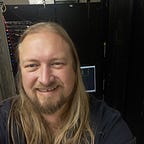What drives us engineers?
Have you ever wondered why people choose engineering careers and the lifestyle it entails? Have you ever noticed that most dedicated engineers their profession engulfs most of their lives? That’s a good thing, it is probably not what you think, and its worth exploring. I have been a professional software developer for almost twenty years, and I would like to share my perspective on it.
Is it about the money? A lot of engineering careers come with very comfortable paychecks, and if you are lucky enough to figure out a niche and start your own business in the tech sector, once you start to rack in the sales, you reach a point where you actually feel like you have “enough” money. That feeling never lasts for long, and it is nice, but its not what drives us engineers to get up and work tireless hours on end. The biggest mistake anyone makes in their career is to get into something just because of the money or prestige. Most of my fellow engineers are there because they love what they do, and what they do is what defines them and creeps into just about every aspect of their life.
Have you ever had a meeting full of engineers? We try to solve everything right there. Project managers are an important role in any tech or engineering discipline, not just to manage deadlines and the like but to reign us in and keep us on track. Planning is just that, planning, not a come up with a solution to each problem we are going to face in the next two weeks meeting. A good project manager gives us a little bit of rope in this regard, get some context anyway, but helps us move on and stay on track. It almost sounds artistic, like we are a bunch of flakes with zero attention span. In fact we are the opposite, the other side of the coin, “hyper-focus”. Left unchecked it can be very detrimental as everyone is hyper focused on their various things and no two are the same. Essentially project managers are like the cowboys in the following video
So what does drive us? It’s the “aha” moments. When you find the problem and it all starts working again, its a feeling like no other. Designing and seeing your ideas come to life. Solutions and fixes are our drug. Planning meetings are our drug dealers house and we “jones” for the next round of … they literally call it “fixes”. There is a very real syndrome called Imposter Syndrome. Basically it is the self doubt that creeps into an engineers mind when something doesn’t get fixed, when we cant find the solution. The only cure is to solve the problem, or prove that its unsolvable as advertised. To give yourself renewed vigor when something isn’t going the right way, sometimes going on to a simple easy to solve problem will give you the clarity and dismiss the “little doubtful voice” long enough to focus on the big problem.
I finally put it all together the other day. I had been struggling with a program I wrote years ago that was giving bad data in the field, but worked fine here in a test environment. I finally figured it out, and was completely confident that was the solution. As I walked away from my desk, everything seemed okay at that point. I wasn’t worried about us having a hard time financially at home, the aches in my back and knees seemed to get a little better, the dark cloud of depression just seemed to lift. Then I realized what I was experiencing, it was an endorphin rush. I am literally addicted to solving problems, and my withdrawls are Imposter Syndrome. It is not a bad thing, it has driven me to my fairly successful career, and I assume drives my co workers too. I hear the desperation and agitation in their voices against problems that they face.
Now that we know that it is likely an actual physiological process that drives us engineers, that enables us to self manage to be more successful. If a problem wont budge, move on, keep a pile of low hanging fruit around. A distraction, a day away from the hard thing to grab something easy and get a little lift of completion and problem solving may be just what you need to come back and approach the bigger problem with renewed vigor. I hope that this gives you, the reader a perspective on us engineers, and to my fellow engineers, may your problems roll over and give up their solutions quickly, but not too quickly. :-)
